Life can be a lot sometimes, right? Between work stress and personal stuff, it’s easy to feel like you’re stuck in a loop of negativity. But here’s the thing—there’s a super simple, totally free way to turn things around. It can boost your mood, help you get along better with people, and even make sense of your own emotions. Say hello to gratitude journaling—a tiny habit that packs a serious punch.
Gratitude journaling isn’t just trendy self-help fluff; it’s backed by science. And guess what? It’s also a powerhouse for improving emotional intelligence (EI). But how exactly does jotting down a few things you’re grateful for each day work its magic? Grab a cup of coffee, and let’s unpack this together.
What Is Emotional Intelligence, Anyway?
Before we dive into gratitude’s role, let’s break down emotional intelligence. Often called EQ (short for emotional quotient), it’s all about recognizing, understanding, and managing your emotions—and tuning into others’ feelings too. Think of it as your emotional superpower. It includes:
- Self-awareness: Knowing what you’re feeling and why.
- Self-regulation: Keeping your emotions in check so they don’t rule you.
- Motivation: Staying driven and optimistic, even when the going gets tough.
- Empathy: Understanding and sharing the feelings of others.
- Social skills: Building strong relationships and managing conflicts.
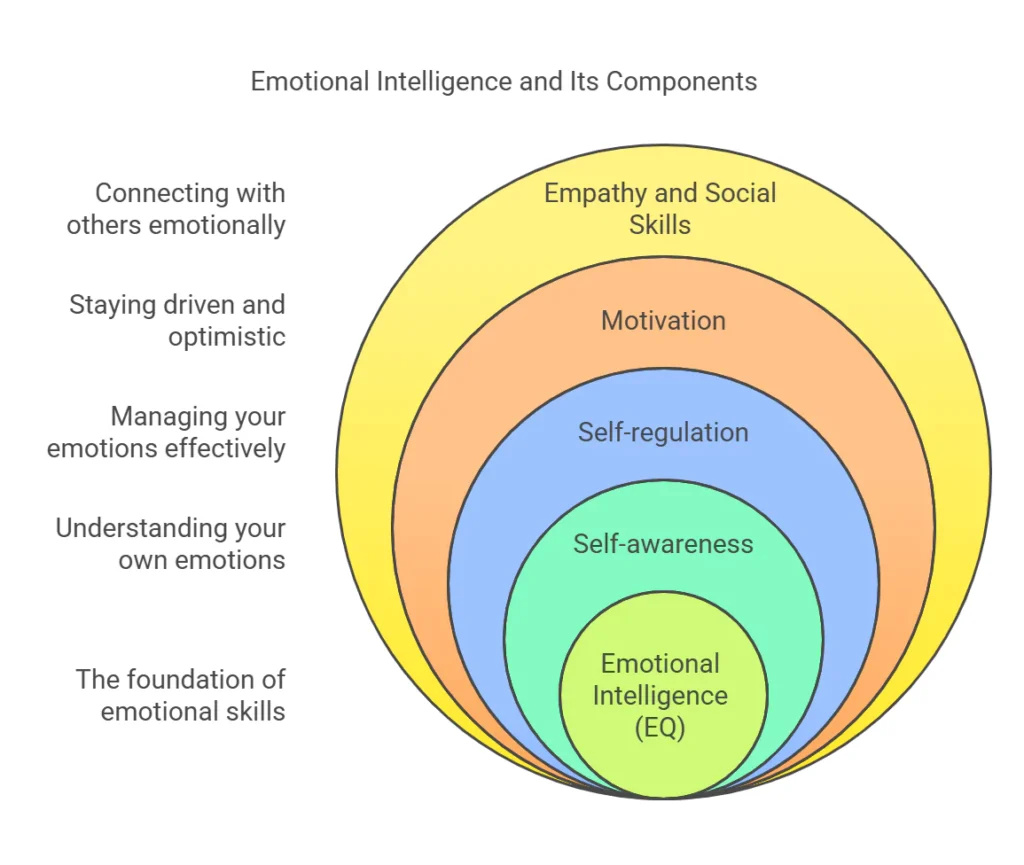
People with high EQ tend to have healthier relationships, better mental health, and more success in work and life. Sounds pretty great, right? That’s where gratitude journaling comes in.
What’s Gratitude Journaling, and Why Does It Work?
Gratitude journaling is as simple as it sounds: regularly writing down things you’re thankful for. Maybe it’s the smell of fresh coffee, a friend’s kind text, or even just a sunny day. These little moments of appreciation add up in ways that science is only beginning to understand.
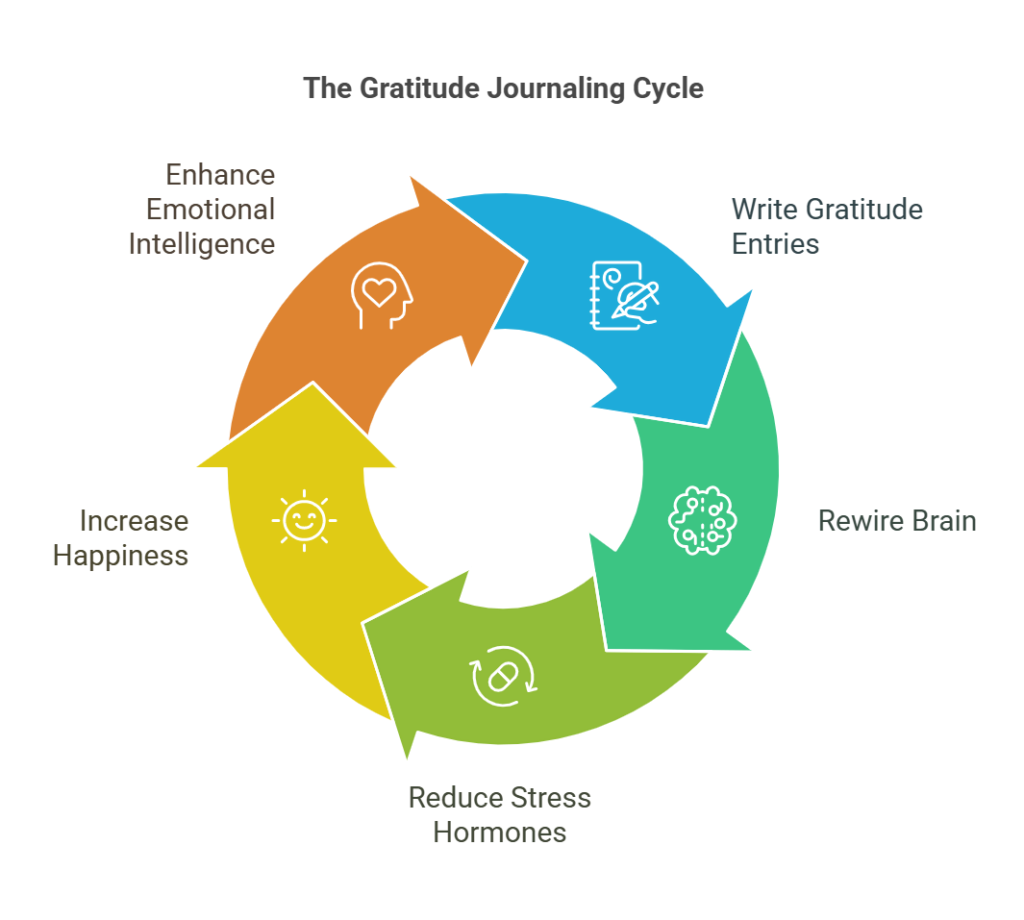
- It’s Like a Mental Tune-Up: Research from the Journal of Personality and Social Psychology shows that gratitude rewires the brain, strengthening neural pathways tied to positive emotions.
- It’s a Stress Buster: According to the Neuroscience of Gratitude article by Positive Psychology, gratitude helps lower cortisol—the stress hormone—and increases dopamine, making you feel happier and more at ease.
- It Boosts Emotional Intelligence: By reflecting on what you’re grateful for, you become more in tune with your emotions, and that’s a key ingredient for high EQ.
How Does Gratitude Boost Emotional Intelligence?
Think of emotional intelligence (EI) as your social superpower—it’s what helps you connect with people, keep your cool in tough situations, and handle conflicts without blowing a gasket. Gratitude journaling takes this superpower and gives it a serious upgrade. Here’s how:
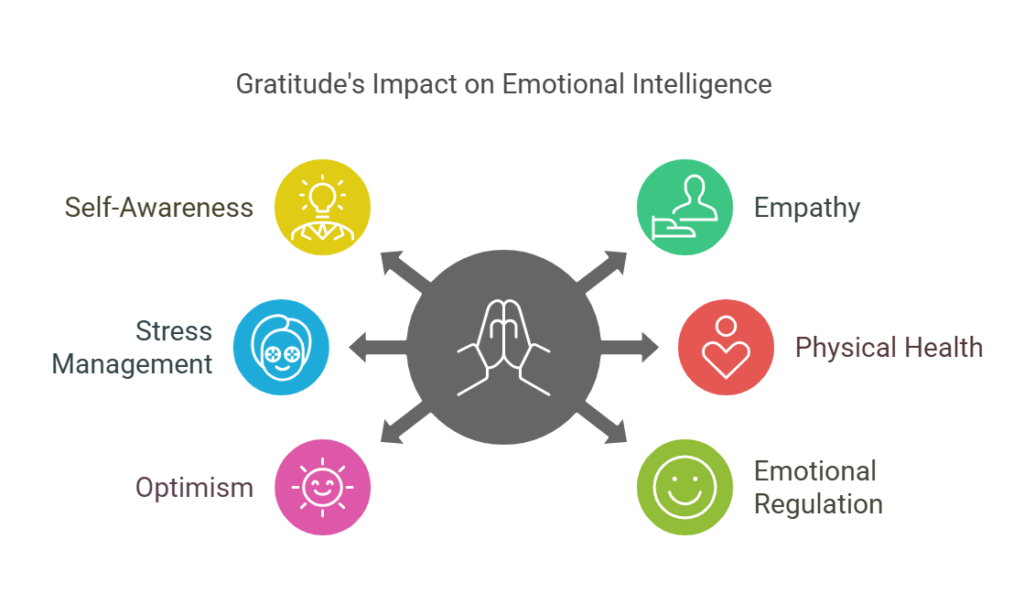
1. It Helps You Know Yourself Better
Writing down what you’re grateful for makes you stop and think about how you’re feeling and why. Over time, you start picking up on patterns—like how certain people or moments consistently make your day better. It’s like shining a flashlight on your emotions and figuring out what really matters to you.
Example: Maybe you notice you’re always writing, “I’m grateful for walks with my dog.” That’s a clear sign those moments bring you joy and calm. Boom—instant self-awareness.
The Science: A 2016 study in Psychological Science found that gratitude helps people understand and express their emotions more clearly. And self-awareness is basically step one in leveling up your emotional intelligence.
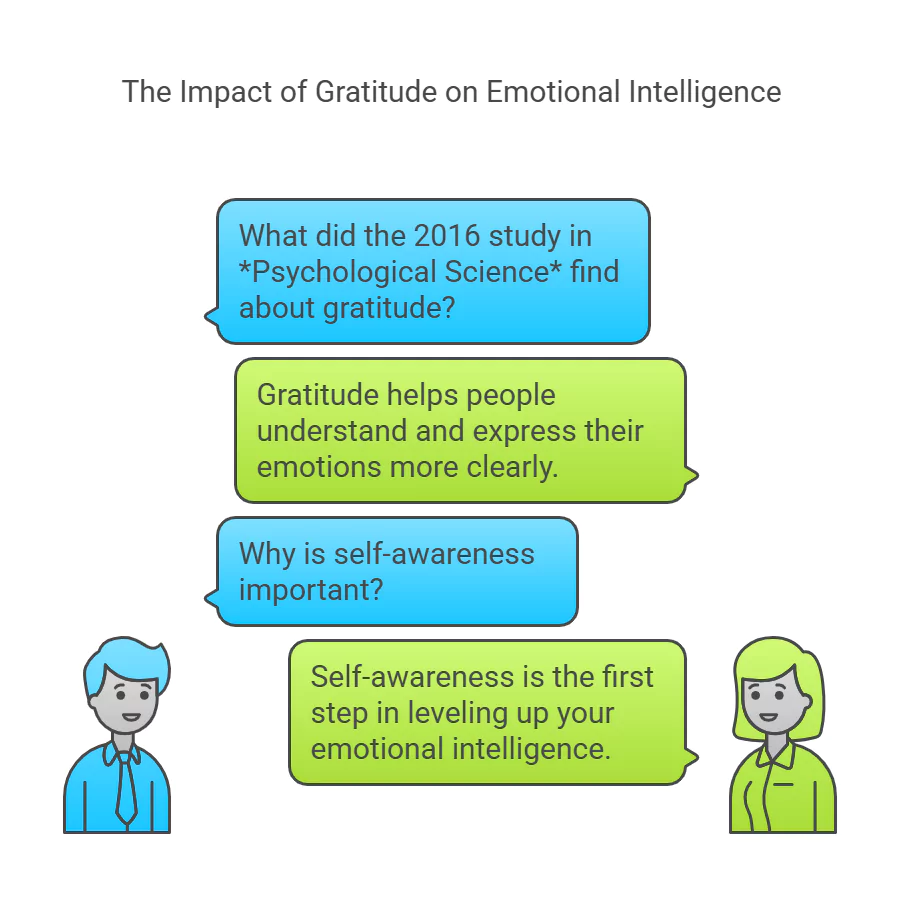
2. It Makes You More Empathetic
When you reflect on what you’re thankful for, you’re often thinking about the people who’ve been there for you—a friend who checked in, a stranger who gave you a kind smile, or a coworker who had your back. It shifts your focus from “me” to “we” and helps you tune into what others might be feeling.
Expert Take: Dr. Robert Emmons, a leading gratitude researcher, says practicing gratitude regularly can “open your heart” and help you build deeper, more compassionate relationships. It’s basically like giving your empathy muscles a workout.
3. It Keeps Stress in Check
Life loves to throw curveballs, and it’s easy to let frustration or anxiety take over. But gratitude journaling helps you reframe things. Instead of dwelling on what’s going wrong, you start focusing on what’s still good. It’s not about ignoring the bad stuff—it’s about finding balance.
Example: Stuck in traffic? Instead of fuming, you think, “At least I’ve got my favorite playlist to jam out to.” That little shift can keep you from spiraling.
Fun Fact: A 2015 study in the Journal of Positive Psychology found that gratitude lowers cortisol (the stress hormone) by 23%. Less stress means you’re less likely to snap under pressure.
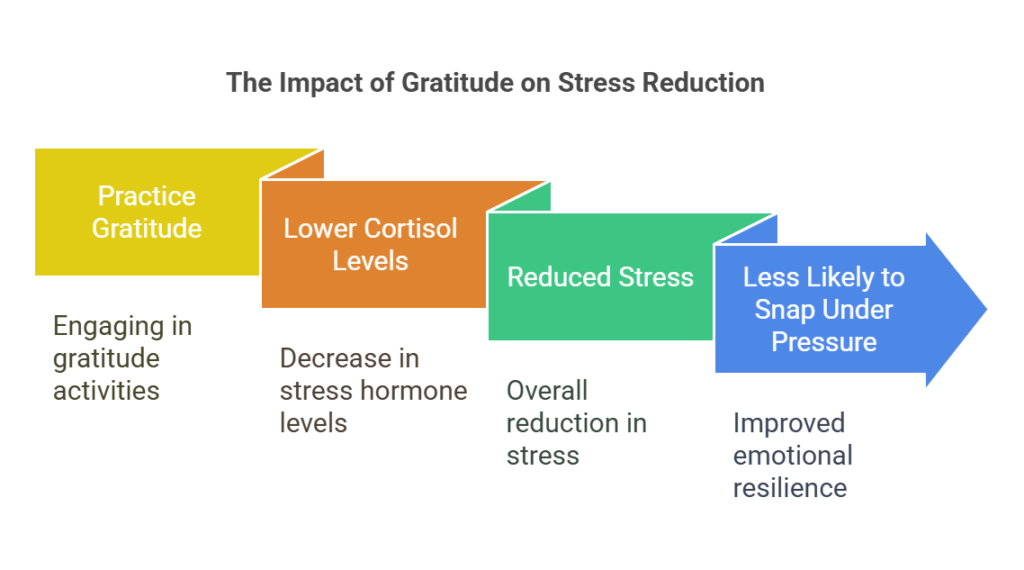
4. It’s Good for Your Health, Too
Here’s the kicker: gratitude journaling doesn’t just help your mind; it helps your body, too. Lower stress means better sleep, a stronger immune system, and fewer headaches. It’s like a domino effect—take care of your mental health, and your body says, “Thanks, I’ve got the rest.”
The Sleep Boost: If your mind won’t stop racing at night, try jotting down a few things you’re thankful for before bed. It helps quiet the noise and sets you up for a better night’s sleep.
Bonus: Gratitude has been linked to better heart health, less inflammation, and just feeling better overall. Who doesn’t want that?
5. It Makes You More Optimistic
Gratitude doesn’t mean pretending everything’s sunshine and rainbows, but it does help you see the silver linings. Over time, it trains your brain to focus on possibilities instead of problems.
Example: You miss your morning train and think, “At least I’ve got time to grab a good coffee.” It’s a small shift, but it turns a frustrating moment into something manageable—or even kind of nice.
6. It Helps You Handle Emotions Like a Pro
When life throws a tantrum, it’s easy to get swept up in your feelings. Gratitude journaling acts like a lifeline, helping you pause, reflect, and find perspective. It doesn’t mean you’ll never get upset—but it makes bouncing back a lot easier.
The Science-y Stuff: Gratitude stimulates the prefrontal cortex—the part of your brain that helps you regulate emotions. Basically, it’s like a mental reset button, helping you respond thoughtfully instead of reacting on impulse.
Practical Tips to Get Started
Not sure how to kick off a gratitude journaling habit? No worries—it’s super simple. Here’s how you can ease into it:
- Start Small: Just jot down three things you’re grateful for each day. They don’t have to be big—small wins like your favorite snack or a funny meme totally count.
- Be Specific: Instead of something vague like, “I’m grateful for my friends,” go for details like, “I’m grateful for the coffee date with Sarah—she had me laughing so hard my stomach hurt.”
- Make It a Habit: Pick a time that works for you—maybe right before bed or while sipping your morning coffee—and stick to it. Consistency is key!
- Use Prompts: Stuck on what to write? Try easy questions like, “What made me smile today?” or “Who’s someone I really appreciate right now?”
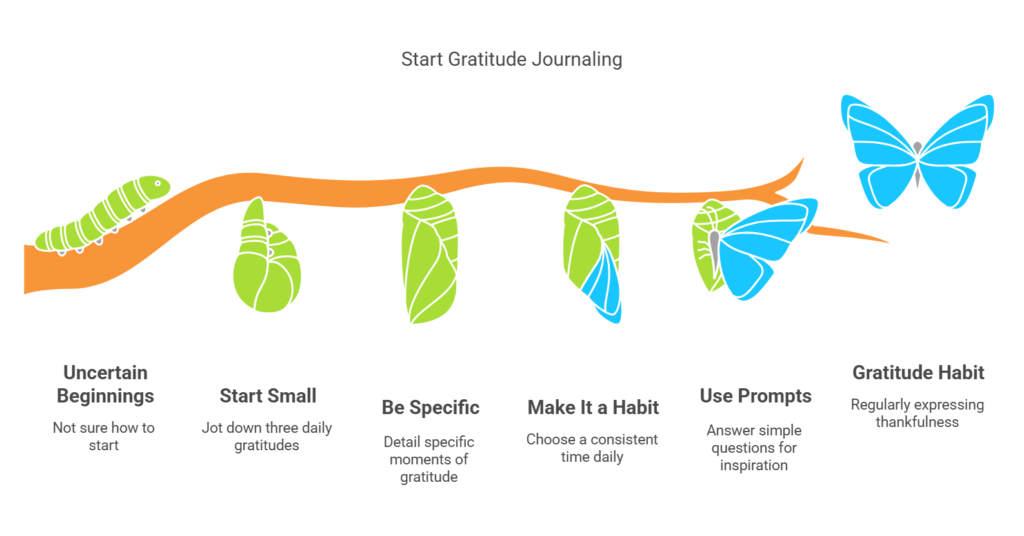
Addressing Common Concerns
“What if I don’t feel grateful?”
That’s okay. Gratitude journaling isn’t about forcing it. Start small like acknowledging, “I’m thankful for this cup of tea,” is a great start.
“I’m too busy to journal.”
It doesn’t have to take long. A quick 5 minutes is enough. Plus, it’s a small investment for big emotional payoffs.
“Will it really make a difference?”
The science says yes! Studies show consistent gratitude journaling improves mental health, relationships, and overall happiness.
The Brain Science Behind Gratitude
Here’s where it gets super cool—gratitude actually rewires your brain. Yep, you read that right. When you practice gratitude, it activates your brain’s reward system, giving you a hit of feel-good chemicals like dopamine and serotonin. Think of it as your brain’s way of saying, “Hey, this feels good—let’s do more of that!”
Over time, this rewiring makes it easier for you to notice the good stuff around you, and that positivity spills over into how you handle emotions and relationships.
Quick Fact: Gratitude journaling gives your prefrontal cortex a workout. That’s the part of your brain that helps you manage emotions and make solid decisions. It’s like strength training for your emotional intelligence!
The Long-Term Payoff of Gratitude Journaling
Let’s take a step back and look at the bigger picture. Gratitude journaling isn’t just about feeling warm and fuzzy in the moment—it’s like throwing a pebble into a pond. The ripples can impact every part of your life over time. Here’s how:
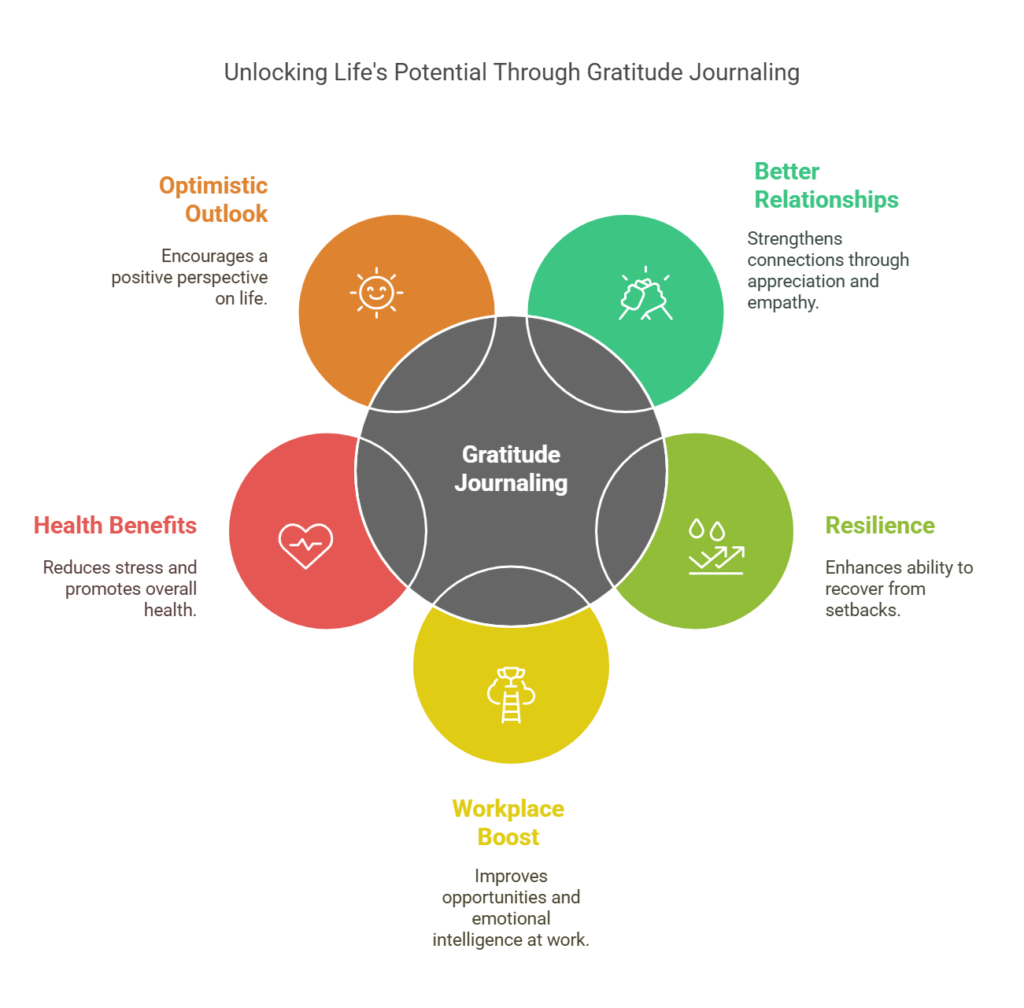
1. Better Relationships
When you focus on what you appreciate about the people in your life, something amazing happens: they notice. Whether you’re writing it down or saying it out loud, gratitude strengthens connections. Studies even show that people who practice gratitude come across as more supportive, empathetic, and trustworthy. It’s a win-win.
Example: If you write about how thoughtful your partner is, you’re more likely to tell them. And guess what? That small act of appreciation can lead to fewer arguments and stronger bonds.
2. More Bounce-Back Ability
Let’s be real—life isn’t all sunshine and butterflies. Sometimes, it throws you a curveball (or ten). But that’s where gratitude comes in clutch. Instead of getting stuck on what’s going wrong, it helps you focus on what’s still going right, making it easier to bounce back when things get tough.
According to a study in the Journal of Happiness Studies it found that people who practice gratitude bounce back from emotional setbacks faster. It’s like having a mental first-aid kit ready to go whenever life throws you a sucker punch.
3. A Boost at Work
Gratitude journaling might not scream “career hack,” but don’t underestimate it. It trains your brain to spot opportunities instead of obstacles. Plus, emotional intelligence is a huge asset at work—it’s what makes great leaders, team players, and problem solvers.
Pro Tip: At the end of your workday, jot down three things that went well. Maybe it was a productive meeting, a kind message from a coworker, or just finishing that annoying task. Over time, you’ll start to feel more positive about your job—and it shows.
4. Better Health, Inside and Out
Here’s the thing—gratitude doesn’t just help your head; it helps your whole body. Lower stress can mean better sleep, a stronger immune system, and fewer headaches. It’s like your brain tells your body, “Relax, I’ve got this.”
The Sleep Factor: If your mind won’t shut off at night, try writing down a few things you’re grateful for before bed. It helps quiet the mental chatter and makes it easier to drift off.
The Physical Perks: Less stress equals better heart health, reduced inflammation, and an all-around healthier you. Who wouldn’t want that?
5. A More Optimistic Outlook
Gratitude journaling doesn’t mean pretending everything’s perfect. It’s about balancing the bad with the good. Over time, it trains your brain to see the glass as half full.
Example: Stuck in traffic? Instead of losing your cool, you might think, “At least I’ve got my favorite playlist to keep me company.” It’s a small mental shift, but it makes a big difference.
6. Better Emotional Balance
When life gets messy, it’s easy to let your emotions take the driver’s seat. Gratitude journaling helps you pump the brakes. Reflecting on the positives makes it easier to pause, take a breath, and respond calmly instead of reacting on impulse.
The Science-y Stuff: Gratitude activates the prefrontal cortex—the part of your brain that helps you manage emotions. It’s like giving your brain a cheat sheet for staying cool under pressure.
How to Level Up Your Gratitude Practice
Once you’ve got the basics down, you can take gratitude journaling to the next level. Here are a few ideas:
- Gratitude Letters: Write a letter to someone you appreciate. You don’t even have to send it—it’s the act of writing that counts.
- Gratitude Walks: Take a stroll and mentally note things you’re thankful for. The fresh air makes it even better.
- Reflect on Growth: Write about challenges you’ve overcome and what they taught you. This helps you see setbacks as stepping stones.
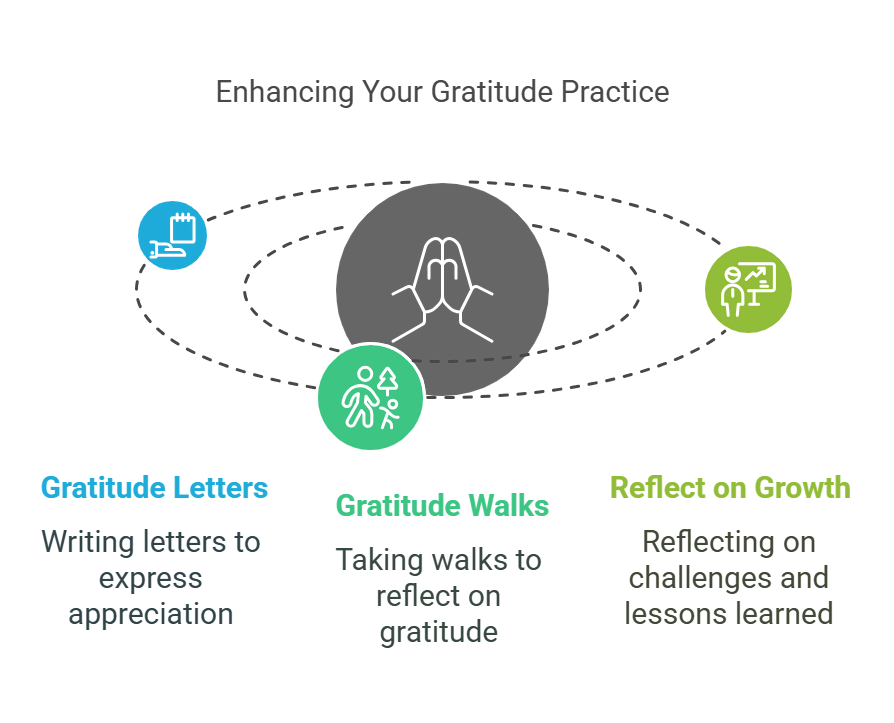
What’s Next? Making Gratitude a Lifelong Habit
Gratitude journaling doesn’t need to feel like a chore or just another thing on your never-ending to-do list. It’s all about weaving it into your day in a way that feels easy and natural. Here are a few tips to keep it going strong:
- Keep It Front and Center: Leave your journal where you can’t miss it—next to your bed, on your desk, or even by the coffee maker. Out of sight, out of mind, right?
- Tie It to a Habit: Pair journaling with something you already do, like sipping your morning coffee or winding down before bed. It’s like killing two birds with one stone.
- Spread the Gratitude Love: Don’t just keep it to yourself—let people know you appreciate them. A quick text, a kind word, or even a thank-you note can make someone’s day and solidify your own practice.
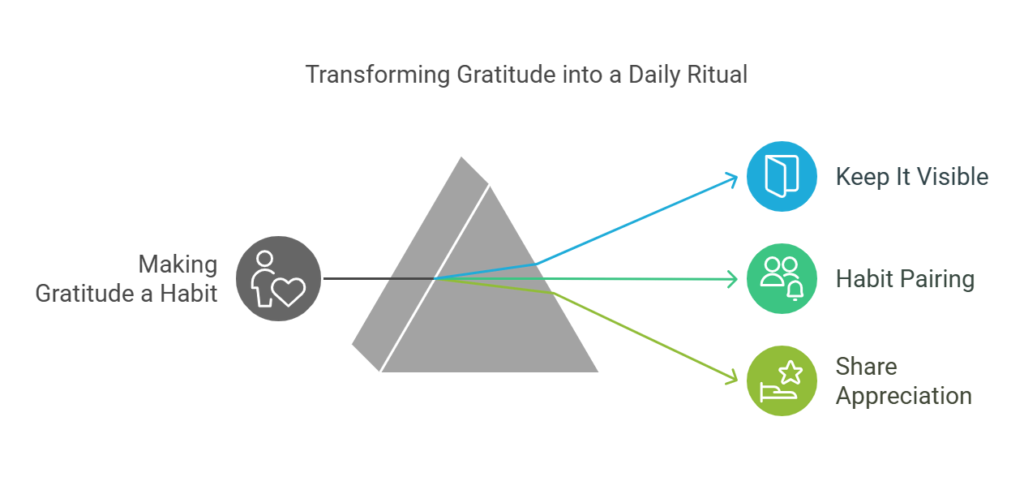
Wrapping It Up
Gratitude journaling might seem like a small thing, but its impact is huge. From improving emotional intelligence to boosting your health and relationships, it’s a habit that pays off in ways you can’t always predict.
So, why not give it a try? Start with one small entry today. Who knows? A few weeks from now, you might look back and realize that this simple practice has helped you see your world—and yourself—in a whole new light.
Study & References Links
- Trait Emotional Intelligence Mediates the Dispositional Gratitude and Subjective Well-Being
Read Study - Gratitude, Emotional Intelligence, and Life Satisfaction Among Older Adults
Read Study - The Neuroscience of Gratitude and Effects on the Brain
Read Article - Do Gratitude Journals Really Work? 4 New Gratitude Findings
Read Article - Benefits of Gratitude: 28+ Surprising Research Findings
Read Article - Associations of Emotional Intelligence and Gratitude with Empathy in Medical Students
Read Study - From Emotion Beliefs to Regulatory Behavior: Gratitude Journaling
Read Study - Giving Thanks May Make Your Brain More Altruistic
Read Article







